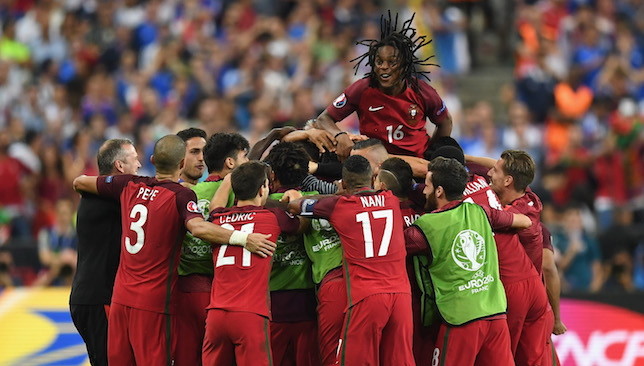
Today’s #360debate asks: Has the 24-team format for Euro 2016 been a success?
In the cold, cash-hungry world of modern football, romanticism is an increasingly rare commodity.
Leicester City gave us a welcome dose of it when they upset the odds to win the Premier League and at Euro 2016, the feel-good factor continued.
Sports fans just can’t get enough of an underdog story and the enthralling tales of Wales and Iceland, which so captured the imagination in France, may not have been possible were it not for UEFA’s new 24-team format.
Both made it to Euro 2016 automatically by finishing second in their qualification groups; in the 16-team format they may have found their chances snuffed out at the play-off stage.
Just imagine this tournament without the thunderous Viking hand clap and Aaron Ramsey’s hair? France would have been a less colourful, less entertaining place for the past month.
Agree with @GuillemBalague. Wasn't convinced beforehand but 24 team format has been a success for me. #EURO2016 https://t.co/tFZCIRBaGB
— Adrian Bevington (@ABevington11) July 10, 2016
The successful runs of Wales and Iceland should bring a tangible return too. They have inspired a generation of aspiring footballers, now keen to follow in the footsteps of their heroes. Importantly, Chris Coleman and Heimir Hallgrimsson spent their final press conferences looking forward, rather than self-congratulating.
World Cup qualification is now firmly on the agenda; capitalising on momentum will be key if progress is to continue. And continue it can. If players are given the opportunity to test themselves against better players, they will inevitably improve.
Wales and Iceland were the poster-boys for the underdogs but they were not alone. Northern Ireland punched above their weight in reaching the last 16, while Albania were a whisker away from escaping Group A, but still celebrated a first win on their tournament debut.
These are all teams that have been considered ‘minnows’, yet have flourished when finally given a platform. It is why calls to stop smaller countries like San Marino and Gibraltar playing with heavyweights in qualifying are wrong; if separated they will likely remain at their level forever, losing their snapshot of what could be.
The big teams can complain all they want – and they will if they keep being eliminated – but UEFA’s ‘the more the merrier’ approach is working.
Football is a sport which has never understood the phrase ‘less is more’. Such thinking is anathema to organising bodies whose ambition and politicking are ceaseless.
This state of affairs has been borne out by the bloated Euro 2016 we have just witnessed, where the pursuit of increased television-rights riches have, again, denatured the product.
Higher on participants but lower on class, a tournament once hailed for its premium quality has undoubtedly been diluted by the rise from 16 nations.
“I think 24 teams are too many,” Germany head coach Joachim Low bemoaned to sport1.de. “Sometimes you get the feeling it’s not doing football any good. The quality is suffering.”
That might be swatted aside as ‘saure trauben’ – sour grapes – from a defeated semi-finalist, but the World Cup 2014 winner makes an informed point. A dour group phrase featured far too much containment, the allure of the best four third-placed finishers progressing to the round of 16 meaning competitors rarely went out on a limb.
A team that failed to win a single group game goes on to win the tournament. Best argument for those against a 24 team tournament. #EURO2016
— John Bennett (@JohnBennettBBC) July 10, 2016
This led to a series of poor matches on a scale never seen before: Albania 0-1 Switzerland, Slovakia 0-0 England, Poland 1-0 Northern Ireland and Italy 1-0 Sweden are stultifying examples.
An attitude prevailed that just one good result was enough – such as Northern Ireland’s win against Ukraine. The scenario where champions Portugal managed to proceed with three points also never occurred from 1996-2012, when entrants were restricted to 16.
The permutations to work out the quartet were also unwieldy, subtracting excitement from the final group games. Albania, Northern Ireland and Turkey were three nations left with an interminable wait for several days to learn their fate.
Ultimately, average sides like Switzerland, Slovakia, Northern Ireland and Republic of Ireland were not worthy of knockout-stage status. Even the success stories provided by Wales and Iceland cannot make up for this.
Of the 16-team vintages, only Euro 1996 with 2.06 goals per game had an inferior average to Euro 2016’s (2.16). The halcyon days of Euro 2000 and the like are over.